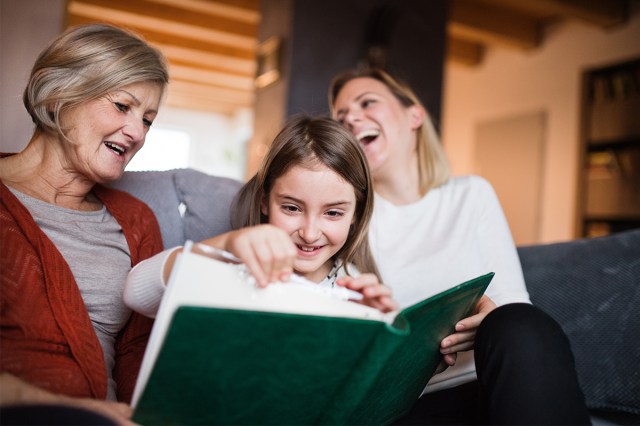Reading together is not just about learning to read. Until a child learns to read on their own, many families carve out moments for storytime and reading aloud. These bedtime stories, afternoons in a reading chair (or wherever families gather to read) aren’t just opportunities to build early literacy skills. They’re moments that foster warmth, connection, and a shared understanding of the world and our place in it. With that in mind, storytime remains important for people of all ages.
Why Storytime Matters for Babies
Long before babies can walk, talk, crawl, or even babble, they can see and hear—and learn. The stark shapes and bright colors in board books help develop visual acuity. Likewise, repetition, rhythm, and rhyme teach babies so much about words and language. Even though babies can’t read, they are learning about the nature of books and reading—that, in English at least, we read top to bottom and left to right, that words are related to pictures, that storytime is intimate and cozy, even fun.
Why Storytime Matters for Toddlers
Once children begin to speak, we have more insight into what they are thinking and feeling, what they like and “no like.” Storytime provides ample opportunity for pointing and naming, questions and answers and early intellectual investigations, like Where did that bunny go?
Toddlers are now self-sufficient (and opinionated!) enough to choose books that hook into their budding interests, and they begin to learn the things that build emotional IQ—imagining the feelings and motivations of a character they identify with.
Why Storytime Matters for School-age Children
For children in elementary school, stories become longer, less picture-driven, and more complex. There’s humor, drama, and more complicated social dynamics. Each of these elements helps to build compassion and empathy while entertaining entertain.
As important as storytime can be, this is when it tends to stop. One British study found that most parents stop reading to their children by the age of 8, the age when children typically read independently. Less than 20 percent of 8- to 10-year-olds in the study were read to daily by an adult.
Sabrina Grimes is a third-grade teacher in Pasadena, Calif., and by the time students enter her class, she sees that kind of data play out in real life.
“I wish parents would continue to read with their children, whatever their language,” said Grimes, who still reads aloud with her son, who just entered the sixth grade. “They still need it.”
Why Storytime Matters for Tween and Teens
For tweens and teens, storytime and reading aloud is rarer and rarer still, particularly once you consider how screens dominate their lives. (Even teens are concerned about how much time they spend on phones or online—nine hours for teens, six for tweens, per one study.)
Meghan Cox Gurdon, the children’s book reviewer for The Wall Street Journal, still reads to her teen and even adult children. Not using books to connect at this age is a missed opportunity. Reading aloud gives adults and teens alike an alternative means of communication, “without the nagging, negativity, and silences that often creep into that dynamic,” she told The Guardian.
“It is a wonderful way of being together without having that pressure or being asked lots of questions,” she said.
The same basic mechanics are at work for this age group. Reading aloud (and being read to) builds vocabulary, grows knowledge, improves listening skills, instills empathy, and, as stories become more mature, can open up ways to discuss difficult topics, like abuse or death.
It’s also, importantly, a balm against the screen. “[Reading together] is an extraordinary distillation of the good things that we want in our lives,” said Gurdon. “We need human connectedness. Many of us want the richness of story and culture and language, something that is deeper than Twitter.”
Why Storytime Matters for Adults
Storytime doesn’t just benefit children, mind you. Gurdon, for one, reads aloud with her husband. As she wrote in her book, The Enchanted Hour (which also champions reading together), “The deeply human exchange of one person reading to another is, in fact, human, which means that its pleasures and benefits are open to everyone” at any age.











